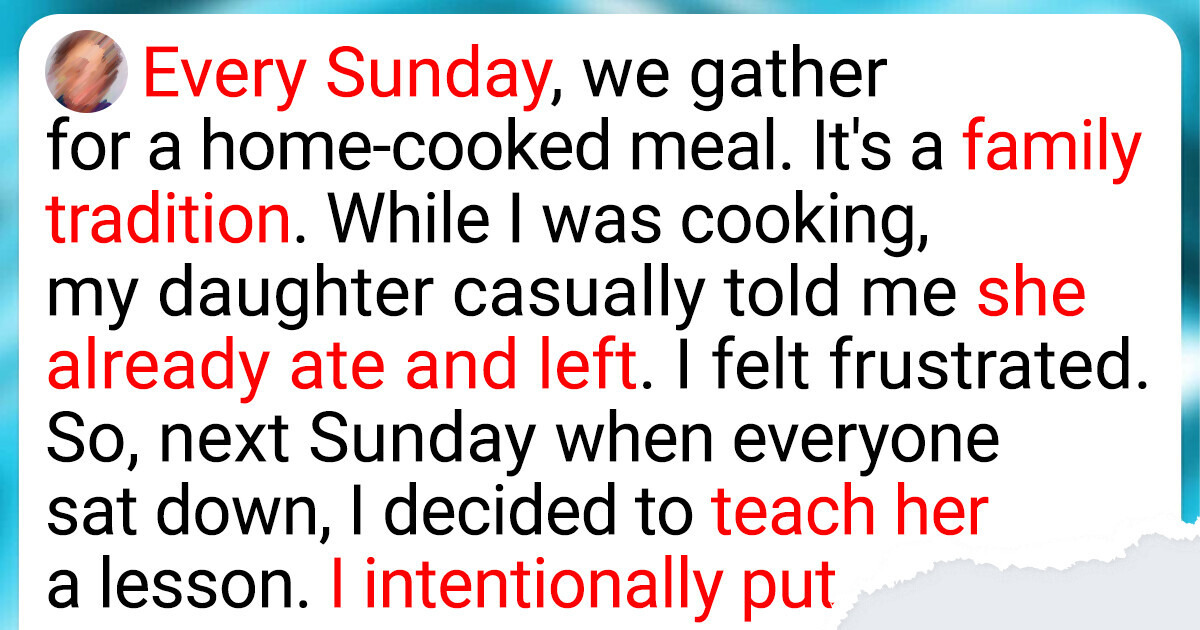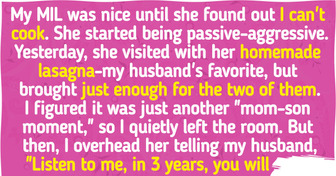I Threw My Stepmom Out of My Dad’s House — It’s Not a Free Hotel


Family dinners have always been a big deal in our house. It’s a time to bond, share stories, and enjoy each other’s company. But recently, I made a decision that has left my entire family furious with me. I excluded my adopted daughter from our family dinner—and now, no one will even look me in the eye, but I know I did the right thing at the moment.
Hi Bright Side!
I love my children, I’ve never questioned that, but recent events have led my whole family to think I do not. I believe people are allowed to have different parenting methods, and I was only trying to teach my daughter a lesson and bring the family together. I’m sharing my story hoping to get some validation and feedback, please help a mother out.
Every Sunday, we gather for a home-cooked meal. My husband and I started this years ago, and it’s now a family tradition. Our kids—my biological son, Jake, and our adopted daughter, Lily—have always been part of it.
No matter what was going on in our lives, Sunday dinner was sacred. It was a rule that everyone followed.
Lily has been part of our family for seven years. We adopted her when she was twelve, and while I love her, we’ve always had a complicated relationship. She keeps to herself, doesn’t open up much, and sometimes, I feel like I’m walking on eggshells around her.
Recently, things have gotten even more tense. She’s been distant, skipping family outings, and barely speaking to anyone. I kept telling myself she just needed space, but deep down, I felt like she was pulling away from us completely.
Last Sunday, while I was cooking, my daughter casually told me she already ate and left. No further explanation or even a “sorry.” I felt frustrated. I was taken aback. Sunday dinner was a non-negotiable tradition, and she knew that.
I looked her in the eye and said, “If you don’t want to be part of this family dinner, then don’t expect to be included next time.” She just nodded and walked away. I thought she didn’t care—but I was wrong.
So, next Sunday, when everyone sat down for dinner, I decided to teach her a lesson. I intentionally put three plates instead of four on the table. “Where’s my plate?” she asked me, but I told her firmly that because she skipped last time, I didn’t set the table for her. I figured she’d eat outside.
Silence filled the room. My husband looked at me like I was a stranger. My son was quiet, and Lily? She just turned and walked away without saying anything. Not even “sorry.” After dinner, my husband pulled me aside and said, “Do you even realize what you’ve done?” He was angry, but I don’t understand why. We argued, but I told him he shouldn’t lecture me and tell me how to raise our daughter.
He is insisting that I should apologize to Lily, or he wouldn’t talk to me. My son initially supported me, saying that I was right in giving Lily what she wanted, but he didn’t take my side in front of my husband. My daughter hasn’t spoken to me since and is kind of avoiding me.
Now, I’m left questioning everything. I never wanted to hurt Lily, but I also don’t think I did anything wrong. My family thinks I crossed a line, but I’m standing by my decision. Should I apologize? Or am I just holding Lily accountable for her actions?
Thank you for writing to us! Navigating family dynamics is challenging, and mistakes are inevitable. Here are a few steps you can take to mend the situation:
Have open conversations: Sit down with Lily and ask her how she feels. You don’t have to agree with her, but giving her space to express herself could help rebuild trust. Understand the reasoning behind her changing behavior and what you can do to make things better for her.
Involve your husband in solutions: Instead of arguing, work together to understand how best to handle conflicts in the future.
Acknowledge Lily’s feelings: Even if you feel justified in your decision, let her know you didn’t intend to hurt her and that her place in the family matters.
Be consistent with family traditions: If Sunday dinner is an important ritual, find ways to encourage participation without making it feel like a punishment.
Seek professional help if needed: If the distance between you and Lily continues to grow, family counseling might help address deeper emotional concerns and improve communication.
Families require patience, understanding, and sometimes difficult conversations. The goal isn’t to be perfect but to build a foundation where everyone feels included and valued.
Another woman wrote to us and shared what made her exclude her stepson from her daughter’s birthday party. Read about it here.











